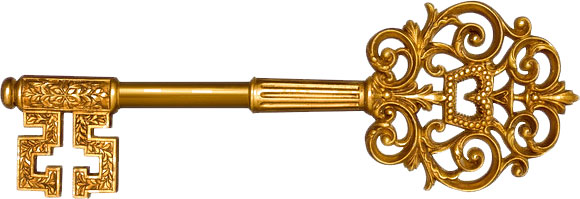
Holding on to Christ's Teachings by Deborah Beach Giordano
The Gift that Keeps on Giving
As he bestows the Holy Spirit upon his disciples, Jesus uses an interesting term; asking that they accept it — as one does with a gift: “Here, I want you to have this.” We might imagine that He’s offering each of them a little package tied with a bow and, as he does, explaining how to use the present that is inside.
Jesus tells the disciples that the Holy Spirit empowers them to forgive the sins of anyone. There are no exceptions. It appears to function as a sort of master key that can release a sinner from imprisonment to guilt and shame and open the way to a new life. Yet this key seems to turn two ways: while it can free people, it can apparently lock them in, as well:
“If you retain the sins of anyone, they are retained.”
 We’ve repeatedly been told that those who sin (that’s all of us imperfect folk) are responsible for our own decisions: whether we shall repent of doing harm and seek to do what is right is up to us — not someone else. No one can force us to turn to the holy Way, nor can anyone condemn us to a lifetime confined to a path of despair and destruction. The choice is ours: whether we shall do good or evil. So what’s with this “retained sins” business?
We’ve repeatedly been told that those who sin (that’s all of us imperfect folk) are responsible for our own decisions: whether we shall repent of doing harm and seek to do what is right is up to us — not someone else. No one can force us to turn to the holy Way, nor can anyone condemn us to a lifetime confined to a path of despair and destruction. The choice is ours: whether we shall do good or evil. So what’s with this “retained sins” business?
An All in One Message
The disciples have locked all of the doors in the house where they are meeting together — because they are afraid. Yet Jesus manages to get through their defenses (!) and the first thing he says is “Peace be with you.” Though they probably do not realize it, it is as profound and meaningful a statement as any the Lord had ever spoken.
“Peace be with you.” We hear that phrase and repeat it ourselves during worship services so often that it becomes a kind of holy boilerplate: something we say because … well, because that’s what you say at this point in the service. We treat it as a simple greeting, a sort of Christ-flavored, “Hi, how are you?” (with no expectation of a reply) and so miss out on its powerful — potentially transformative — meaning.
 The word Jesus uses is shalom. Usually translated as “peace,” the term covers a vast descriptive territory: while it can mean the absence of conflict, it is beyond a mere armistice or truce; it is an untroubled sense of security, without any worries or fears. Shalom is health and abundance, tranquility and contentment, grace and goodness; a profound trust in God’s mercy and compassion. It is truly a heavenly peace.
The word Jesus uses is shalom. Usually translated as “peace,” the term covers a vast descriptive territory: while it can mean the absence of conflict, it is beyond a mere armistice or truce; it is an untroubled sense of security, without any worries or fears. Shalom is health and abundance, tranquility and contentment, grace and goodness; a profound trust in God’s mercy and compassion. It is truly a heavenly peace.
In contrast to their fear and isolation, Jesus brings his disciples the gift of shalom. It is a blessing, a prayer, a reminder, a summons. You could call it the Cliffs Notes® version of the Lord’s ministry: an abbreviated description of who He was and how He lived — and of the Way we are to follow: courageously, graciously, openly in the world.
A Training Session
“Peace be with you.” From the moment of his arrival, Jesus sets the scene and establishes the ground rules: Shalom, My followers: live in peace, in faith, in fearlessness. Do not be afraid. And, by the way: I’ve got work for you to do.
“Just as God sent Me, now I am sending you.”
Pull up your socks, open the doors, and go out into the world. No more sitting around, shivering and sulking; no more avoiding or excluding those who do not view the world as you do. You are My disciples and you are to continue My ministry.
It is at this point that the Lord asks them to receive the gift of the Holy Spirit. No one is forced to accept it, although everyone apparently does. And then He tells the disciples about their power to forgive — or retain — the sins of others. Which brings us back to our initial question: what does it mean to retain others’ sins? Is it a special power that comes from the Holy Spirit? Or is it a sort of coda to the reception of the Holy Spirit; does Jesus begin with a blessing/teaching (Be shalom!) and end with another: a warning to be careful in how they handle forgiveness?
It seems to make the most sense if this is understood as an additional teaching given to the newly-fledged apostles (as they now are, having been formally “sent forth”); as they venture forth into the wide world with a new, greatly-enhanced spiritual power: don’t misuse it. The Lord never withheld forgiveness, but pronounced it freely, generously: dispensing hope and healing to all He met — even, as we remember, from the Cross. In the agony of death and suffering, Jesus begged his heavenly Father to forgive the very ones who tortured him.
Although they can assure sinners of divine mercy and forgiveness — in keeping with what Jesus did, to refuse to do so would be destructive and unfaithful to the Lord. Further, God alone has the power to forgive, it is up to the singular sinner to repent and seek the holy Way; the rest of us don’t directly figure into it.
Yet now, in the Risen Christ’s first, quite brief encounter with his followers, he once again talks to them about the result of forgiveness and the consequences of its refusal. The Lord must believe that it is very important.
Trapped like a Rat
 So, who is it that will retain/be stuck/permanently penned in by/never free from sins that are not forgiven? If it isn’t the one who did the sinning…. then it must be the one who doesn’t do the forgiving. The key to being healed and free from hurt and harm lies in the hand of the forgiver.
So, who is it that will retain/be stuck/permanently penned in by/never free from sins that are not forgiven? If it isn’t the one who did the sinning…. then it must be the one who doesn’t do the forgiving. The key to being healed and free from hurt and harm lies in the hand of the forgiver.
The glorious, intoxicating joy of the divine Presence can overwhelm us, and we may erroneously imagine that we are not merely blessed — but the particular favorites of God. It is alarmingly easy to fall into the trap of setting ourselves above others, dismissing and demeaning those who are different, determining who is deserving of our compassion and forgiveness. Our job is to follow the Lord. Failure to forgive is a failure to follow — and the only one we hurt is ourself.
It is essential that we remember: forgiveness is not the same as approval or permission, nor does it excuse or deny the damage that was inflicted. Forgiveness is the acknowledgement that we were injured (none of that: “Oh, never mind, it’s OK,” when It.Was.Not.Ok.), it is the releasing of resentment, the letting-go of expectations of changed behavior (including, often, the hope for an apology). It is not necessary — and can be downright dangerous — to reconcile with the one who has harmed us. What matters is that we release ourselves from imprisonment to What Happened Then.
This is now, and each day — each hour, each minute — offers a new beginning. To remain caught up in the past is to give the one who hurt us continuing power over our lives and welfare; it is quite possible that to the perpetrator both ourselves and the event has been long-forgotten, while we carry them around with us for years and years. We hold the key to our own prison cell; we alone can use it.
“If you forgive the sins of anyone, they are released;
if you hang on to the sins of anyone — you’re stuck with them.”
~ the Gospel according to Deborah
“You’re letting them live in your head, rent-free.”
~ Mike F., AA member
Having our Hands Full
As Christians, we have received the gift of the Holy Spirit and thereby accepted our responsibility to continue Jesus’ work. We are called to do as He did: to go forth in His Name, comforting and encouraging, healing and blessing, and affirming God’s mercy and forgiveness to everyone we meet. Everyone.

It’s a big job. We’ve got our hands full — which is a good thing.
If our hands are filled with the power of the Holy Spirit, we cannot point fingers, push others aside, cling to our pride and our prejudices, or hang on to past hurts and regrets. All we can do is reach out with love and compassion — just as the Lord Christ taught us to do.
The peace of the Lord be with you,
Deborah ✟
Suggested Spiritual Exercise
Feel your heart and your hands filled with shalom/Christ’s peace.